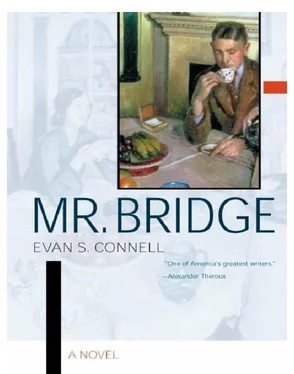Carolyn asked if they had seen the weather vane atop the chimney — a copper rooster. Douglas remarked that the workmen were building a barbecue oven in the back yard.
Ruth said, “I hope they’re more exciting than the rest of the people in this neighborhood.”
“We ought to be finding out very soon,” said Mrs. Bridge.
The new family moved in on the first day of May. Their name was Snapper. Leo Snapper was short and swarthy, with a long, straight nose and quick, reddish eyes like the eyes of a fox. His wife Edith was taller, thin as a mannequin, with elaborately coiffured pearl-gray hair. She walked with a cane, as though she did not see very well. They had two daughters several years older than Ruth whose names were Judith and Olivia, and there was an Oriental chauffeur.
Carolyn said, “Are they Jews?”
Mrs. Bridge replied: “I don’t see what difference that makes. Do you?”
“No,” Carolyn said. “I just wondered.”
“How come they never say hello to anybody?” Douglas asked.
“That’s not our affair,” his mother said. “But goodness, doesn’t she look like the Empress Josephine with that hair?”
“I wonder what business that fellow is in,” said Mr. Bridge more to himself than to anybody else.
“I was asking Lois,” Mrs. Bridge said. “I believe it’s import-export.”
“They got a dog,” Douglas said, “only it’s a poodle.” He was disappointed about the dog because a poodle was an indoor, unnatural sort of dog. Except for the weather vane, which he liked, and the remote possibility that he might be invited to a barbecue, he was generally disappointed with the new neighbors.
“I saw their cars,” Carolyn said. This, she felt, was the notable thing about the Snapper family. “They leave the garage doors open to show off. I’m not sure what one of them is, but two of them are Cadillacs.”
“One’s a Cad,” Douglas said wearily. “One’s a Buick. One’s a this year’s Olds. You can tell from the fenders a mile away.”
Ruth was disappointed that there were no sons in the family; however, the haughty sophistication of Judith and Olivia almost made up for this. She wanted to get acquainted with them. She hoped they would introduce her to the men they knew.
“Well,” Mr. Bridge observed, “just as long as they’re decent people. That’s the main thing.”
“Oh, I’m sure they are,” said his wife. “I think we have an awfully nice neighborhood.”
“I do, too,” he said. “Let’s hope it stays that way.”
He had spoken lightly about the Snappers, but he was apprehensive. Three cars seemed unnecessary and therefore pretentious, and the copper rooster was absurd, and the woman’s hair style was flamboyant. A conservative, cultivated family with less money would have been preferable to a vulgar millionaire. Then, just a few days after the Snappers moved in, the weather turned warm and their awnings were put up. Leo Snapper had his initials on the awnings. The initials could be read half a block away.
“Lord, what next,” Mr. Bridge said, shaking his head.
His wife lifted her hands. “My stars, I couldn’t agree more! Isn’t that the limit?”
“I won’t be the first bit surprised,” he said, “if those people set a flagpole in their yard.”
Douglas, who had not been listening closely, heard this and glanced at his father with sudden interest, because a flagpole would be a good thing to climb; but then, reading his father’s expression, he understood the remark. “I think they’re okay,” he said. “Mr. Snapper’s a good guy.”
“Oh?” Mr. Bridge asked. “What makes you say that?”
“Vandermeer’s glider sailed over the fence the other day and Mr. Snapper didn’t get sore. He sailed it back.”
“Well,” Mr. Bridge said, smiling a little, “time will tell. I don’t care for the man’s taste. Otherwise, I have nothing against him.”
And as he thought about this statement he decided it was true; the new neighbors were gaudy, but after all that was not a serious offense. He could not feel cordial toward them, and he did not care to know them better, but perhaps their entrance into the neighborhood would not make any difference.
53 The Regatta on Ward Parkway
The major event of the month of May, as far as Douglas was concerned, was not the arrival of the Snapper family but the sailboat race on Ward Parkway pond. Scheduled for Sunday, May 31st, it was open to all boats built in the manual training classes of the public grade schools. Ribbons would be awarded to the first twelve boats to sail across the pond. Douglas had been working on his boat since February, but still it was not finished. Several times he had asked his mother if she could drive him to the pond on Sunday the 31st, and each time she promised she would.
“Providing you ever get that boat finished,” Mr. Bridge said to tease him. Then Douglas insisted he would finish the boat. When asked what color he intended to paint it he said white, as though anyone should know. Boats sail better when they are painted white. His father did not believe this, and asked who had told him such a thing. Douglas did not know, but it was true. Everybody knew white boats went faster. He was asked how many boys in his class were building boats. There were eight or nine, he thought. He was not sure.
“Vandermeer’s making one,” he added, “but I don’t know if he’ll get finished on account of he keeps doping off.”
“Not ‘on account of.’ We say ‘because.’ ”
“Okay, okay! So anyhow, Mr. Teale got sore at him the other day and threw an eraser at him, except it hit another kid.”
Mrs. Bridge glanced anxiously at her husband. Every once in a while she heard of teachers throwing things, or slapping a child, or otherwise behaving strangely, and at every such report she became alarmed.
“Mr. Teale’s really got a terrible temper,” Douglas went on. It was clear that he wished to make the manual training class sound as adventurous as possible. “Whenever you dope off he throws things. All of a sudden— pow! He hit Tipton with a piece of chalk last week.”
“That could put somebody’s eye out,” Mrs. Bridge said. “Has he thrown anything at you?”
“Well, sure. He throws stuff at every kid in class. Usually it’s just a wad of paper, unless he gets good and sore. I stay out of his way if he looks sore.”
“That’s using your head,” said Mr. Bridge.
“Are you coming to the race, Dad?”
“Am I invited?”
Douglas made a face and Mr. Bridge laughed.
“All right, you finish that boat and I’ll go watch the race.”
Douglas answered disdainfully that he could finish the boat in two or three days, but he wanted to do a good job. “Some guys do it any old way,” he said. “Sutton Boggs finished his up yesterday, but if he enters it in the race it’ll probably sink.”
Mr. Bridge began to realize the importance of the sailboat. Thinking back, recalling the number of times Douglas had mentioned the boat, he wondered if it had assumed some significance that the boy was not aware of. Never before had he worked so laboriously at anything. Never before had he shown the least pride in anything he did; yet now there was pride shining in his eyes as he described how he planed the spars and how he had planed and sanded the deck until it was so thin that he could almost see light through it. He had cut the keel from a sheet of tin, and Mr. Bridge remembered the evening when he had drawn a picture of the keel and explained how he had screwed lead weights to the bottom, filled the screwholes with putty, and then sandpapered the putty so that not a mark remained. Now, listening again to his son talk about the sailboat, he reflected that Douglas without quite knowing what he was doing had begun work on his life.
Читать дальше












